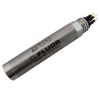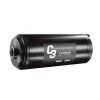Turner Designs C6P Submersible Fluorometer
Features
- One, two, three, four, five or six optical sensors
- Robust memory - over 60,000 data lines
- Optional 3-brush mechanical wiper helps eliminate bio-fouling
- Expedited repair and warranty service
- Lifetime technical support
- More
Overview
The Turner Designs C6P Submersible Fluorometer can be configured with up to six optical sensors ranging from the deep ultraviolet to the infrared spectrum. Internal memory storage capacity combined with an external submersible lithium ion battery allow the C6P to run during extended or short-term deployments. Each C6P comes with a factory-installed temperature sensor. Optional factory-installed depth sensors and mechanical wipers are also available. The durable delrin housing is highly resistant to harsh environments. C-Soft Windows-based software allows for intuitive calibration, datalogging set-up and file management capabilities as well as data integration.
- Weight in Air: 2.54 kg (5.6 lbs.)
- Length: 27.43cm (10.8 in.)
- Diameter: 13.84cm (5.25 in)
- Material: Delrin plastic
- Temperature: -2 to 50 degrees C
- Depth: 0 to 600 meters
- External Power: 8 to 30 VDC
- Output: Digital Signal
- Interface: RS232 Interface
- Maximum Sample Rate: 1 Second
- (1) C6P submersible fluorometer
- (1) PC interface cable
- (1) 12V power supply
- (1) Factory-installed temperature sensor
- (1) Communication and integration cable
- (1) "Y" style USB to male and female DB-9
- (1) 8-pin female dummy plug
- (1) CD with software, user's manual, and quick start guide
In The News
Source Water Monitoring in Albany, New York: Tracing Water Quality throughout Tributaries
Thousands of US cities pull their drinking water from natural source waters like reservoirs, rivers, and streams, making overall watershed health a key consideration for water providers. In Albany, New York, the Albany Department of Water and Water Supply delivers drinking water to over 100,000 residents as well as monitors and manages the larger drinking water supply watershed. Hannah Doherty, Environmental Specialist at the Albany Department of Water and Water Supply , spends her days working with a small team to monitor the drinking supply and the connected water bodies. Doherty explains, “We’re the first to encounter the water that ends up being the drinking water.
Read MoreWildfire Prevention in the Sierra Nevada Region with the Yuba Watershed Institute
Though recent wildfires have sparked new conversations about wildfire management and response, groups like the Yuba Watershed Institute have been monitoring the forests and water resources of the Sierra Nevada region for decades, managing approximately 5,000 acres of land with the Bureau of Land Management (BLM) and about 7,000 acres in private land partnerships. The goal of the Institute is to work with local communities and land agencies to improve watershed and forestry management through informed practices and public outreach. The goals of the Yuba Watershed Institute are three-fold: Improve the ability of fire suppression agencies like the California Department of Forestry and Fire Protection ( CAL FIRE ) and the US Forest Service.
Read MoreWave Sensors Integration with NexSens Buoys: A Cutting-Edge Solution for Wave Measurment
Real-time wave data supports accurate weather prediction, safe and efficient maritime operations, and provides valuable safety and operating condition information for recreation and commercial fishing. Understanding wave dynamics also helps with the design of protective coastal structures like seawalls, breakwaters, and jetties. It also supports better prediction of their impact on sediment transport and coastal geomorphology. Wave data is a key factor in qualifying and designing offshore wind farms and harnessing kinetic energy for electrical generation. It helps with the understanding of ocean-atmosphere interactions and contributes to studies of sea-level rise and climate change impacts.
Read More






























